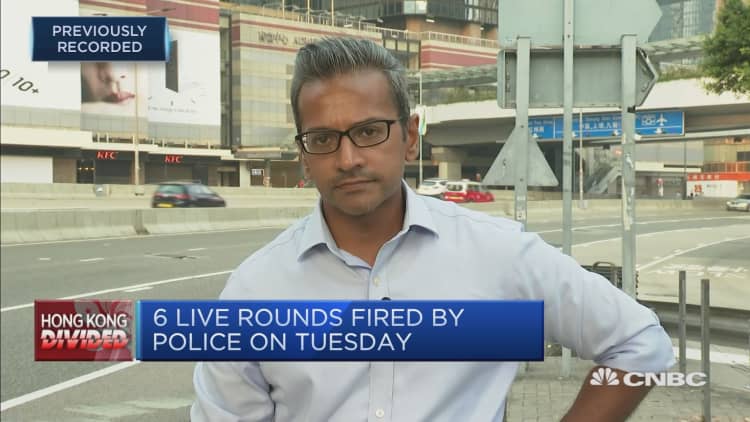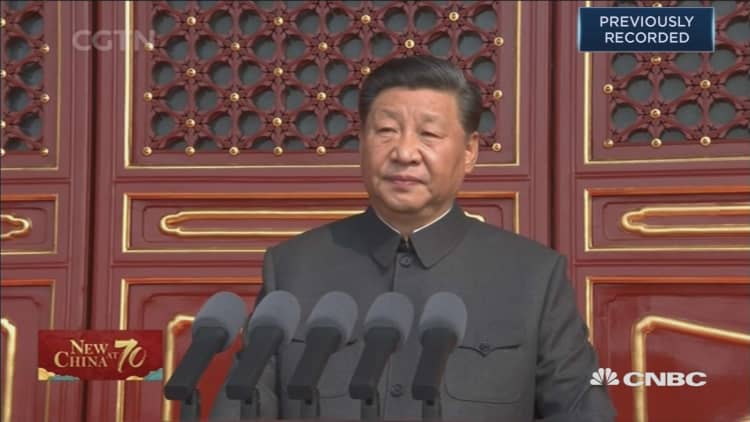
Now that China's 70th anniversary celebrations are over, Beijing could take a "much harder" line on Hong Kong if violence continues to mount in the city, says a professor at Cornell University.
"I think the escalation of protests on the day of the anniversary celebrations has already tested Beijing's patience and the situation now seems ripe for Beijing to stage a direct intervention," Eswar Prasad, a professor of trade policy at Cornell University, told CNBC on Wednesday.
Police shot an 18-year-old protester in Hong Kong on Tuesday as violence escalated in the Chinese territory, despite a ban on rallies that day. It came the same day China celebrated the 70th year of the Chinese Communist Party's rule with a massive display of its military might.
The shooting in Hong Kong was the first such known incident since pro-democracy demonstrations in the territory began peacefully on June 6. The rallies have since turned increasingly violent.
I worry about China potentially ... taking a much harder line which could cross from rhetoric into action.Eswar PrasadCornell University
Hong Kong, a former British colony, returned to Chinese rule under a "one country, two systems" principle in 1997. Since then, citizens of the semi-autonomous city have been given some legal and economic freedoms not given to citizens in mainland China.
"It's difficult, especially in light of the rhetoric we saw coming out of the 70th anniversary celebrations from Xi Jinping and others, to see China willing to stay on the sidelines much longer, especially ... if the violence continues to mount," Prasad said, adding that any overt use of force before October 1 would have "tarnished" the celebrations.
Chinese President Xi Jinping said during a the National Day speech on Tuesday that the central government would "maintain long-term prosperity and stability of Hong Kong and Macao." He reiterated that China "must remain committed to the strategy of peaceful reunification, and 'One Country, Two Systems.'"
Beijing previously sent troops into Hong Kong as the military pledged that it would protect "national sovereignty." Chinese propaganda outlets have also released a video showing military vehicles amassing near the border of the city.
In another speech on Monday, Xi said: "The complete reunification of the motherland is an inevitable trend; it is what the greater national interests entail and what all Chinese people aspire for. No one and no force can ever stop it!"
Pointing to the rhetoric coming from the celebrations, Prasad said: "I worry about China potentially ... taking a much harder line which could cross from rhetoric into action."
One country, two systems
Protesters in Hong Kong are "pushing to test ... the limit" of the "one country, two systems" rule, said Wang Gungwu, a professor at the National University of Singapore.
The problem is that there has "always (been) a lot of ambiguity" with that system, said Wang, the chairman of the university's East Asian Institute.
"This was a problem from the very beginning, neither side could really agree, even at the time when they were drawing up the basic law," he said, saying there was no agreement on spelling it out in greater detail.

"They left it, as it were, to common sense and to practice and to actual experience ... but I think what has happened is that the actual management of the two systems has not satisfied anybody," he said.
The demonstrations started in June against a now-withdrawn extradition bill, which would have allowed suspects in Hong Kong, a Special Administrative Region, to be sent to mainland China for trials. They have since snowballed into a movement for full democracy and autonomy from Beijing.
— CNBC's Evelyn Cheng contributed to this report.


